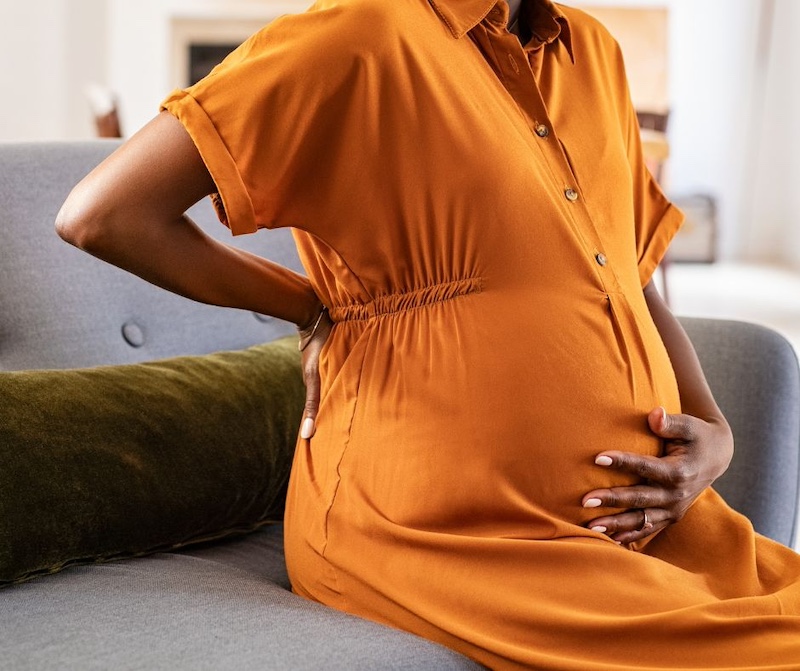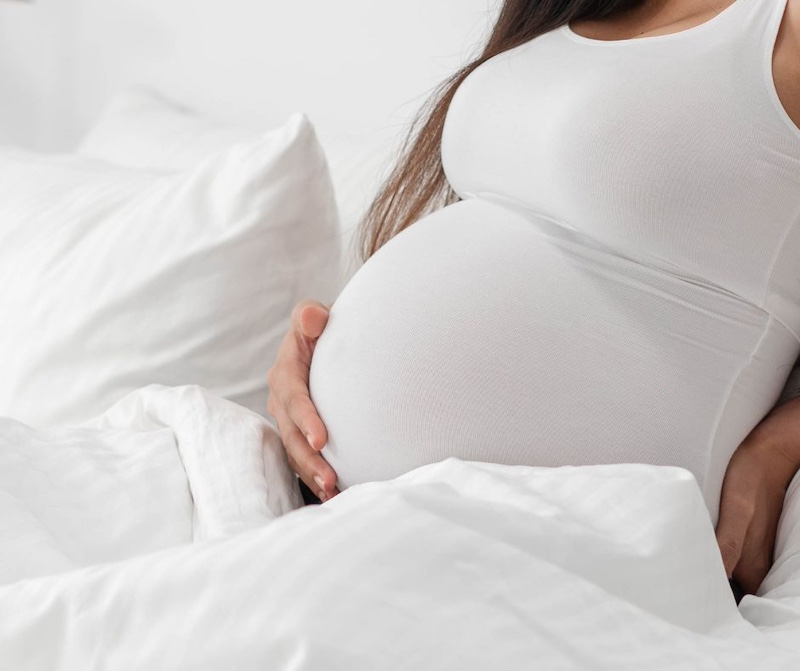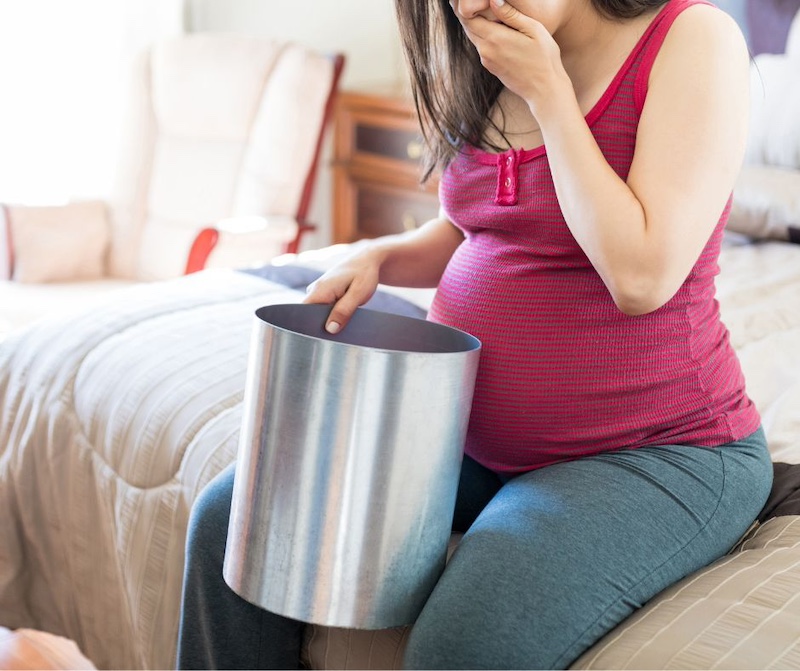When I was in the throws of early pregnancy nausea with my second child, I remember reading some quote from Kim Kardashian or another celebrity who I usually wouldn’t pay attention to, but it caught my eye nevertheless (thanks, Instagram algorithm!).
The quote was simple and cut to the chase: “Being pregnant was the worst time of my life. I love my kids, and I would do it again for them if I had to, but it was horrible.”
^ I had never felt so seen. Why was this the first time I was seeing this sentiment expressed in popular media? Why did it take a reality TV star to comment on something that is so obvious to everyone that’s ever been through the experience, but so little discussed in the public domain?
In the age of online transparency, why are women still so shy about owning their truths and talking about how much they hate being pregnant? We need– so critically– to change the narrative on the long outdated notion that pregnancy is a fun experience for everyone, because the reality is, for many women it is not.
***
For many women, myself included, pregnancy represented a kind of quiet agony.
For many women, myself included, pregnancy represented a kind of quiet agony. All of my pregnancies felt like they lasted forever, and pushed me to the brink of my mental sanity and bodily fortitude. The first-trimester nausea and fatigue were debilitating and brutal, and each would have pushed me out of the workforce if I didn’t already work from home as the editor of this magazine, which I own (and thus, I could create my own schedule and move things around when I needed to vomit or rest, for example).
The constant low mood stemming from being so uncomfortable– except for a brief reprieve during the second trimester– remain the darkest times of my life. Like Kim Kardashian, I would do it again for my kids if I had to– I love my kids!– but the pregnancies that got them here did not bring me joy. Quite the opposite, in fact. I have three kids, and each of my three pregnancies felt like something to get through, not something to be savored.
It still feels so crazy to me that pregnant women are expected to continue to participate in society while feeling like absolute shit all the time. The world just continues moving, even as the daily routine of even just brushing one’s teeth can feel exhausting by the end.
Mind you, I looked great in all of my pregnancies– had the quintessential little bump, people would comment on my body unsolicited to tell me how good I looked. (Yes, I agree, commenting on other people’s bodies is always inappropriate– but I include these anecdotes only to say that while I looked from the outside like I was having the magical pregnancy “glow” that so many voices in our culture idolize, I was absolutely miserable on the inside.)

I looked cute and functional, but I hated being pregnant– and according to recent research, this experience is more ubiquitous than pop culture would have you believe.
According to The Motherhood Center of New York, during the pandemic, 70-80% of mothers experienced a perinatal mood disorder or PMAD, a figure that in normal times is estimated closer to 1 in 5 mothers, or about 20% of that population. What’s worse, 80% of these cases go undiagnosed and untreated. That’s INSANE!
It’s my armchair theory that many of these women are set up for an experience of shame and isolation in early motherhood because those feelings begin with what is often left unspoken in pregnancy. If we hide the hard part from the world when we are expecting, why shouldn’t we expect to hide our feelings once the baby arrives?
The research, of course, bears this out. According to the center’s research, 50% of PMADS begin during pregnancy. Even scarier, PMADs remain a leading cause of maternal death in the United States, with numbers that are particularly devastating and disproportionately distributed amongst the BIPOC population.
For me, in each of my pregnancies, there was a quiet agony throughout the whole experience. Brutal nausea, crippling fatigue, skin so itchy it kept me awake at night. And we need to talk about this more, because the shame and subconscious guilt that makes so many mothers feel alone in the experience is robbing women of their life force during a time in life when we all need support and comfort– not cutesy platitudes and praise– to help us move through what is, certainly, the hardest thing we will ever do in life.
We need to talk about this more, because the shame and subconscious guilt that makes so many mothers feel alone in the experience is robbing women of their life force during a time in life when we all need support and comfort– not cutesy platitudes and praise– to help us move through what is, certainly, the hardest thing we will ever do in life.
When I’m pregnant, I feel like I am not fully a person– or at least not myself– and I find myself receding inward as the months go on. By third trimester, oddly, I often feel my best, if only because I know the end of the experience is near. Rather than fear birth, as some women do, I looked forward to it as a kind of escape– something to finally release me from the uncomfortable truth of having to share my body.
In a culture where most women find themselves worrying about birth like it’s some sort of scary, mystical rite of passage, moreover, I look to it as a final stage of relief– relief from the awful experience of pregnancy. I love and adore meeting my children, of course– but the joy of no longer being pregnant is also a wonderful bonus.

To be clear, hating being pregnant does not mean you don’t love your kids.
Hating being pregnant does not mean you don’t love being a mom.
Hating being pregnant also doesn’t mean that you aren’t grateful for the fact that your body is capable of pregnancy. And that you wouldn’t do it all over again if you had to. Many things in life are hard or even downright draining but they are still worth doing.
Hard experiences in many ways give our life deeper meaning– that’s one of the reasons not to shy away from doing hard things. We (almost always) come out stronger as a result of having the experience. Such is often the result of uncomfortable pregnancies, as well.
Hating being pregnant simply means that you hate being pregnant– and it’s time the world stopped shaming women for telling the truth when this statement is true for them.
Hating being pregnant simply means that you hate being pregnant. Admitting this simply means you are comfortable being honest about an experience that popular culture, social institutions, the commercial economy, ubiquitous advertising, and various religious traditions all have a vested interest in sugar-coating for the wrong reasons.
We don’t talk honestly and openly about the true depth of discomfort that can come with pregnancy because our culture shames this kind of honestly from pregnant women. “You’re ungrateful,” the culture seems to imply, or, “You must not love your kids, then!”
^ This, my friends, couldn’t be further from the truth!
And it makes my heart sad that this messaging is so deeply ingrained into the psyche of first-time moms.
And I know it’s real, because I don’t feel any conscious pressure from anyone or any institution to put on airs about my own pregnancy experience– I even had a mother and aunts who openly told me they hated being pregnant and felt like they had the flu for 9 months!– yet I still somehow feel a vague sense of shame using the word “miserable” to describe my pregnancy experiences. That’s the culture at work. The pressure to perform and conform, it seems, is invisible yet pervasive.

With each of my kids’ pregnancies, I felt like I was not among the living. Like my life was on pause because everything took a back seat to feeling crappy most of the time. My brain was foggy; as a person who prides herself on being introspective and creative, I found myself for one of the first times in my life feeling totally uninspired, most of the time. This, surely, led to bouts of unplacable depression– which I didn’t recognize or have diagnosed at the time, but in hindsight, it’s very obvious to me that this is what was going on.
I think it’s telling that many women are often only comfortable talking about their pregnancy woes when another woman– often someone who is older or who has been through it before– admits that they didn’t love the experience, either.
I had two experiences after the birth of my first daughter that highlight this point.
Once, about 6-7 months after my eldest was born, I went to get a facial at a local spa, as a self-care day. The aesthetician doing the procedure was pregnant, and when she asked me about my baby I made some comment about how I love her so much and I’m so happy my pregnancy is over, because it was horrible.
The woman started tearing up and said this was so true, and that no one ever told her this about pregnancy before. How terrible it truly was for her. I settled in to a resolute validation of her feelings and made my take on this clear: “I personally don’t know a single woman who enjoyed being pregnant.” I speak only for myself here, but this remains my honest experience.
Several months later, while visiting a friend and fellow new mom who I hadn’t seen in years, she said, as if it was something new and revelatory, “I feel like no one talks about this!” when I told her I was miserable in pregnancy. “All my friends told me I was a goddess the entire time I was pregnant,” she said. “But really, all I wanted was for it to be over.”
^ I think it’s telling, of course, that many of the women telling my friend she looked like a goddess didn’t yet have their own children. It animates just how overtly we as a culture glorify the position of pregnancy at a distance, until we come to know it intimately. Pregnancy sucks (for most of us), and there’s no shame in admitting so if that’s your experience. (If you’re reading this and you’re like, “That wasn’t true for me! I loved being pregnant!” then I will simply ask you: Why did you click on this article?)
The sad part is, I know that some people will circulate or comment on this post with anger or outrage– such is the culture we live in. Few women (and sometimes men!) seem to be totally outraged by the idea that pregnancy can be awful– like, “How dare you besmirch this sacred experience!”.
The sad part is, I know that some people will circulate or comment on this post with anger or outrage– such is the culture we live in. Few women (and sometimes men!) seem to be totally outraged by the idea that pregnancy can be awful– like, “How dare you besmirch this sacred experience!”.
^ But that’s just the thing. I’m not doing that. I do NOT deny that pregnancy can be a perfectly lovely experience for some women. But it was not at all lovely for me, and it was not lovely for any woman, friend, or family member, who I’ve ever discussed this with. And this, to me, represents a huge PR problem resting at the core of the hetero reproductive experience.
We need to stop denying the bad parts of pregnancy and acknowledge that ALL EXPERIENCES ARE NORMAL. The good and the bad.
If we don’t, and the discomfort of pregnancy remains an open secret, we will continue to shame, stigmatize, and alienate generations of women to come by making them feel alone in their suffering. All feelings fester when denied. Often, just being able to speak openly about them eases some of the suffering. This is my plea for us to start doing that.

Anecdotally, most of the women I know are happiest once pregnancy is over and there’s a baby in their arms. The pregnancy is just a means to an end. In this case, it is about the destination, not the journey.
I’m convinced that this is why maternity photo shoots were invented– to give women something to feel good about, for once, during pregnancy. Because so much of the day-to-day is just misery. We want credit for going through this experience, because it isn’t a cake walk by any means.
Ultimately, my point is this: it’s okay to see pregnancy simply as a means to an end, something to get through. If it’s not fun for you, that’s okay, embrace it and call it what it is. That’s step number one of feeling better.
Secondly, don’t lie to other women about your experience or sugarcoat it– I think that’s part of how we got into this cultural paradigm of romanticizing pregnancy in the first place. (It might also have something to do with Judao-Christian and also Eastern-tribal family values that place emphasis on the importance of family-centered procreation at all costs, but I digress…)
All feelings fester when denied. Often, just being able to speak openly about them eases some of the suffering. This is my plea for us to start doing that.
We need to have this conversation openly and honestly and not feel bad about it. The hormones are real, powerful, and will often fuck you up during this time. Pregnant women need real support, not patronizing compliments.
In addition to saying congratulations, moreover, I want to be able to also say, “And don’t worry: in case you feel like garbage, just know that this experience is temporary and it will be over soon.” I want to be able to say this to pregnant friends and not feel like I’m letting them in on insider secret that they’ve already learned the hard way.
Ultimately, there is more safety and comfort in recognizing the full spectrum of pregnancy experiences– not to make women feel scared, but to make them feel seen, safer, and more validated in their honest bodily experience.
Only then will the veil of suffering in pregnancy start to lift– Either that, or we need to engineer a way for men to have babies. THEN the truth would come out, and be unequivocably validated– probably within days.
***
Related: These 6 Comfy, Sustainable Maternity Clothing Brands Can Make Your Pregnancy More Tolerable.

Leave a Reply